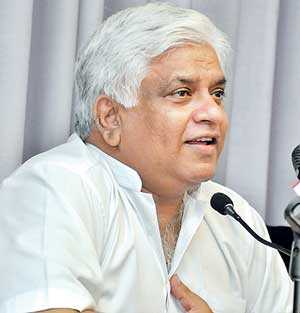Sunday Feb 22, 2026
Sunday Feb 22, 2026
Thursday, 18 October 2018 00:37 - - {{hitsCtrl.values.hits}}
By Charumini de Silva
The Government yesterday said the proposed joint venture between Ceylon Petroleum Corporation (CPC) and Lanka Indian Oil Corp. (LIOC) to develop the oil storage facility in Trincomalee will soon be inked, after obtaining Cabinet approval on the lease duration within next week.
Dismissing speculations on the proposed joint venture, Petroleum Resources Development Minister Arjuna Ranatunga assured that the fresh agreement aims at developing the oil storage facility to attract much needed foreign exchange for the economy through off-shore bunkering facilities, and to create a strong fuel distribution network in the Northern and Eastern provinces.
“We are trying to get 85 tanks to be repaired through this CPC–LIOC joint venture we have proposed, which was approved by the Cabinet. We might also invite some investors (petroleum industry people) to come and work with us to develop those, where preference will be given to local investors. There is a total of 100 tanks, but we count it as 99 tanks. Already 15 are leased to LIOC in an agreement signed in 2003. Now, through a new agreement, we are trying to get 16 tanks out of the remaining 69 tanks dedicated for CPC,” he told reporters in Colombo yesterday.
In 2003, LIOC, a subsidiary of Indian State-owned IOC, bought one-third share in Ceylon Petroleum Storage Terminals Ltd., which operates the China Bay tank farm. The CPC and Colombo entered into a MoU with Lanka IOC to grant a long-term lease to the Indian firm for operating the 99 storage tanks at Trincomalee for 35 years, for an annual fee of $100,000. However, the 35-year lease finalisation dragged on for years, and trade unions and different factions of society questioned the Government plans for the 99 storage tanks, each with a capacity of 12,100 tons.
Acknowledging there is an ongoing court case on the leased oil tankers, the Minister refrained from commenting, yet confirmed that there was no objection from the Supreme Court on the fresh agreement.
According to the Minister, Cabinet has approved having the complete land ownership under Government of Sri Lanka, handing over the complete ownership of those 15 tanks to LIOC, and rebuilding the remaining 69 tanks through the joint venture to get complete ownership of 16 tanks to CPC.
However, when queried, Ranatunga stated he was not certain if the CPC would be able to get 16 dedicated tanks under the proposed joint venture, as it is an area that needs to be negotiated with LIOC.
“We have still not decided whether these 16 tanks will be within the proposed joint venture; we will have to discuss it in forming the proper contract with the concerned parties,” he added.
He also pointed out that at the Ministry level, no analysis has been performed on the capital and the costs involved for the project yet. “They will have to come up with the costing structure, because we are acting as a facilitator here. We haven’t done anything on the costing part for repairs. What I was told by some of the engineers analysing this was that it costs about $1 million per tank. We would be able to give more details within the next two to three weeks,” he added.
The Minister, who will accompany Prime Minister Ranil Wickremesinghe during his official visit to India this week, said they hope to discuss further details regarding the Trincomalee oil tank farm. In addition, Ministers Sagala Ratnayake and Malik Samarawickrama will join the Premier in this tour to India, where they will meet high-level delegates, including Indian Prime Minister Narendra Modi.
Minister Ranatunga said the Ministry was expecting a directive from the Cabinet of Ministers within the next week on the duration of leasing these tanks to LIOC. “We still haven’t got Cabinet approval on timing. We will get a directive within next week. President Maithripala Sirisena directed us to submit a detailed report on the joint venture.”
Assuring that the Ministry was doing its best to reap maximum benefits to Sri Lanka from this joint venture, he noted that it will open up new business avenues for petroleum development in the country, as well as reduce a significant cost involved in distribution, particularly in the North and East.
“So far, LIOC was in line with us in terms of the joint venture, but I have not gone through all the details yet,” he added.
Pointing out that LIOC currently has a cost advantage over landing fuel at the Trincomalee port and was making profits via bunkering, the Minister said Sri Lanka could also do the same in future, if the joint venture could be implemented soon. “There are so many opportunities, but our own people are opposing the development of these openings for the economy. I am trying to give a licence to CPC for bunkering, and the papers are already done. There is a great opportunity for offshore bunkering in both Hambantota and Trincomalee ports.”
The 99 tankers are located on 850 acres of land in close vicinity to the Trincomalee Harbour, built in 1944 under the British rule. Out of the 101 storage tanks built, there are only 99 remaining at the moment, with two having been destroyed due to World War II attacks.